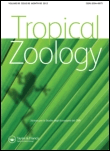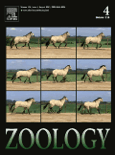
TROPICAL ZOOLOGY
Scope & Guideline
Advancing the frontiers of tropical wildlife research.
Introduction
Aims and Scopes
- Biodiversity and Conservation:
The journal focuses on documenting and analyzing the biodiversity of tropical animal species, highlighting their conservation status and the threats they face. - Ecological Research:
Research on the ecological interactions of species within their habitats is a core focus, including studies on habitat occupancy, feeding ecology, and community structure. - Behavioral Studies:
The journal includes studies on animal behavior, including ethology and thanatological behaviors, providing insights into the social and survival strategies of various species. - Ethnozoology and Human-Animal Interactions:
Explorations of the relationships between human cultures and wildlife, including traditional uses of animals and their roles in local economies, are also featured. - Taxonomy and Systematics:
The journal contributes to the taxonomic literature by describing new species and providing records of lesser-known taxa, enhancing our understanding of tropical biodiversity.
Trending and Emerging
- Post-release Ecology and Rehabilitation:
An emerging focus on the post-release behavior and survival of rehabilitated animals, as seen in studies of sloths, reflects a growing interest in conservation practices and animal welfare. - Ethnozoological Studies:
There is a rising trend in research exploring the cultural significance and uses of wildlife among local communities, emphasizing the integration of cultural perspectives in conservation. - Species Behavior and Ecology:
Increased attention is being paid to the behavioral ecology of species, including unique mating behaviors and ecological roles within their environments, which is essential for understanding biodiversity. - Biogeographical Studies:
Research focusing on biogeographic patterns and species distributions in tropical regions is gaining ground, helping to inform conservation strategies in light of climate change and habitat loss. - Diversity and Community Structure:
There is a growing emphasis on understanding species diversity and community dynamics, particularly in understudied regions, which is crucial for effective conservation efforts.
Declining or Waning
- Aquatic Ecosystems:
Research specifically on aquatic ecosystems and their fauna appears to be waning, possibly as more studies have been published in this area, leading to saturation. - Traditional Taxonomic Studies:
While taxonomic work remains important, there seems to be a decline in traditional descriptive taxonomy, as researchers increasingly focus on integrative approaches that combine genetic, ecological, and morphological data. - Generalized Habitat Studies:
There is a noticeable decrease in general studies of habitat without specific focus on particular species or ecological interactions, indicating a trend towards more targeted research.
Similar Journals

GAYANA
Exploring the depths of Animal and Aquatic research.GAYANA is a pioneering journal in the fields of Animal Science and Zoology and Aquatic Science, published by EDICIONES UNIV, CONCEPCION in Chile. With an ISSN of 0717-652X and an E-ISSN of 0717-6538, this journal has been at the forefront of research dissemination since its inception in 2006. Recognized in 2023 with a Q4 quartile ranking in both its categories, GAYANA provides a platform for researchers and practitioners alike to explore and publish their findings. Despite its relatively new establishment, the journal has carved a niche in aquatic and animal research, as evidenced by its Scopus ranks in the 12th and 7th percentiles, respectively. With challenges in access options, GAYANA emphasizes the significance of open scholarly communication, fostering an academic environment where knowledge is shared and advanced. Contributing to GAYANA means being part of a growing community dedicated to understanding and conserving our natural world.

BELGIAN JOURNAL OF ZOOLOGY
Elevating Zoological Research to New Heights.The BELGIAN JOURNAL OF ZOOLOGY, published by the Royal Belgian Zoological Society, serves as a prominent platform for advancing research in the field of zoology. With an impact factor reflecting its status within the academic community, this journal rigorously publishes innovative studies and reviews, covering a broad spectrum of topics related to animal science and zoology. As an esteemed outlet, the journal ranks in the Q2 category for both Animal Science and Zoology, demonstrating its relevance and contribution to the field, as indicated by its Scopus ranking of 255 out of 490. Although it operates under a subscription model, the journal is committed to disseminating high-quality research that can shape contemporary understanding of animal biology and ecology. With a publication history dating back to 1990 and extending through 2024, researchers, professionals, and students are encouraged to engage with its rich content, which is vital for ongoing discourse and discovery within zoological sciences.

CALIFORNIA FISH AND GAME
Illuminating the Path for Conservation EffortsCalifornia Fish and Game is a prominent journal dedicated to the fields of Animal Science and Aquatic Science, published by the California Fish and Game Editor. With its roots extending back to 1979, the journal has served as a vital platform for disseminating research focused on the wildlife and aquatic ecosystems of California and beyond. Recognized within the Q4 quartile for both Animal Science and Zoology and Aquatic Science, it provides critical insights and scholarly contributions, despite its comparative rankings within the respective categories. The journal, with an ISSN of 0008-1078 and an E-ISSN of 2331-0405, offers an invaluable resource for researchers, professionals, and students alike, looking to deepen their understanding of California's rich biodiversity and ecological challenges. For those interested in open access options, further details can be reviewed through the journal's platform. By fostering a community of inquiry, California Fish and Game plays an essential role in advancing knowledge and conservation efforts in the fields of interest.

RAFFLES BULLETIN OF ZOOLOGY
Connecting Insights in Zoology and ConservationRaffles Bulletin of Zoology, published by the National University of Singapore's Lee Kong Chian Natural History Museum, serves as a prestigious platform for the dissemination of cutting-edge research in Animal Science and Zoology, as well as Ecology, Evolution, Behavior and Systematics. With a current impact factor reflective of its Q2 category in both fields, this journal not only enhances its visibility in the academic community but also provides valuable insights into the complexities of biodiversity and conservation efforts. Covering a wide array of topics, Raffles Bulletin facilitates interdisciplinary collaboration and serves as an essential resource for researchers, professionals, and students alike. It is indexed in Scopus, ranking #233 out of 490 in Animal Science and Zoology and #406 out of 721 in Ecology, ensuring that the research published contributes significantly to the global discourse on wildlife and ecosystem management. Since its inception in 1996, this journal has bridged gaps in knowledge and continues to foster a deeper understanding of the living world.

RUSSIAN JOURNAL OF THERIOLOGY
Fostering Insights into Evolution and BehaviorRUSSIAN JOURNAL OF THERIOLOGY is a prominent academic journal published by KMK SCIENTIFIC PRESS LTD in collaboration with the esteemed Moscow State University. As a dedicated platform for researchers in the fields of Animal Science and Zoology, Ecology, Evolution, Behavior and Systematics, and Plant Science, this journal strives to advance our understanding of terrestrial ecosystems and their inhabitants. Although it currently holds a Q4 ranking and ranks within the lower percentiles of its respective categories, the journal's consistent publishing output since 2011 showcases a commitment to facilitating scientific discourse and collaboration. Addressed to a diverse audience of researchers, professionals, and students, RUSSIAN JOURNAL OF THERIOLOGY serves as an essential resource for disseminating valuable insights and fostering future advancements in the biological sciences.

Journal of Zoo and Aquarium Research
Advancing conservation through innovative research.Journal of Zoo and Aquarium Research is an esteemed publication dedicated to advancing the field of zoology and aquatic sciences. Published by the European Association of Zoos & Aquaria (EAZA), this journal provides a dynamic platform for sharing groundbreaking research, best practices, and conservation efforts within zoos and aquariums, making it an invaluable resource for researchers, professionals, and students alike. With an increasing focus on the importance of biodiversity and sustainable practices, the journal is committed to fostering scholarly communication that enhances the understanding of animal care, species conservation, and habitat preservation. Although specific metrics such as impact factor and HIndex are currently unavailable, the journal's rigorous peer-review process ensures that only high-quality research is disseminated. As an open-access publication, the Journal of Zoo and Aquarium Research promotes accessibility to vital information, encouraging a broader engagement with critical issues in wildlife conservation. By addressing contemporary challenges in the field, this journal stands as a pivotal resource for those dedicated to promoting animal welfare and ecological sustainability.

ZOOLOGY
Celebrating 30 years of excellence in zoological studies.ZOOLOGY, an esteemed journal published by Elsevier GmbH, stands at the forefront of research in the Animal Science and Zoology fields. With a notable impact factor and recognized as a Q1 category journal in its discipline, ZOOLOGY is highly regarded among researchers, ranking #98 out of 490 in Scopus rankings. Founded in 1994 and continuing through to 2024, the journal aims to publish cutting-edge, peer-reviewed articles that contribute significantly to the understanding of zoological sciences. Based in Munich, Germany, ZOOLOGY provides both subscription and open access options, ensuring that influential research reaches a wider audience. It serves as an essential platform for disseminating innovative findings, connecting scholars globally, and fostering interdisciplinary collaboration to advance zoological knowledge.

PAKISTAN JOURNAL OF ZOOLOGY
Fostering collaboration for a thriving zoological community.Pakistan Journal of Zoology, established in 1975 and published by the Zoological Society of Pakistan, is a pivotal resource in the field of zoology and animal science, contributing to the academic discourse and research advancements in the region. With an ISSN of 0030-9923, this journal strives to disseminate innovative research findings and scholarly articles that explore various facets of animal biology, ecology, and conservation. Although classified in the Q4 quartile within the animal science category, its commitment to providing a platform for emerging researchers makes it crucial for those in the zoological community. The journal covers a broad range of topics relevant to contemporary issues in zoology, promoting both local and international collaborations. Situated in Lahore, Pakistan, its contributions are vital for promoting biodiversity awareness and conservation efforts within the region. Accessible research outputs empower students and professionals alike to engage in critical discussions and applications within the disciplines of zoology and animal science.

North-Western Journal of Zoology
Exploring the Depths of Zoological ResearchNorth-Western Journal of Zoology is a prominent scholarly publication dedicated to the field of zoology, fostering a vibrant exchange of research findings and insights among scientists, professionals, and students. Published by UNIV ORADEA PUBL HOUSE in Romania, this journal has been a reliable source for advancing knowledge in Animal Science and Zoology since its inception in 2008, with its publications spanning until 2024. With an engaging focus on innovative research and review articles, the journal proudly holds a Q3 quartile ranking in its category for 2023, positioning itself within the competitive landscape of Scopus Ranks. Although currently lacking an open-access model, the journal provides a valuable platform for disseminating critical findings essential to understanding animal biology and ecology. Researchers contributing to this journal benefit from a dedicated readership, furthering the discussion and practical applications of their work in diverse contexts.

Redia-Journal of Zoology
Elevating research in zoology and beyond.Redia-Journal of Zoology, published by the CRA-Research Centre Agrobiology & Pedology in Italy, is a distinguished academic journal dedicated to advancing the field of zoological studies through high-quality research and insightful reviews. With an ISSN of 0370-4327, this journal provides a platform for scholars and practitioners in the Agricultural and Biological Sciences to disseminate their findings and engage in meaningful discourse. Recognized in the 2023 Scopus rankings as Q2 in its category, Redia occupies a notable position within the global research community, ranked 138 out of 221 in Agricultural and Biological Sciences. The journal has a commitment to publishing original research from 2011 until 2024, contributing to the body of knowledge in diverse sub-disciplines of zoology, ecology, and conservation. While currently not open access, Redia strives to foster collaboration and discussion among researchers, making it a vital resource for advancing zoological sciences.